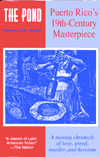|
|
The Pond (La Charca): Puerto Rico’s 19th-Century MasterpieceZeno-Gandia, Manuel (preface by Kal Wagenheim; introduction by Juan Flores)
 Before the turn of the century, while the rich in Madrid, Paris and Rome capped their sumptuous dinners with sips of Puerto Rico’s exquisite black café, the anemic men, women and children who harvested the precious crop lived in squalid huts and rarely saw a scrap of meat. Brutalized by grinding poverty, theirs was the harsh world of Manuel Zeno-Gandia’s La Charca, published in 1894 and widely acknowledged as the first major novel to emerge from Puerto Rico. Before the turn of the century, while the rich in Madrid, Paris and Rome capped their sumptuous dinners with sips of Puerto Rico’s exquisite black café, the anemic men, women and children who harvested the precious crop lived in squalid huts and rarely saw a scrap of meat. Brutalized by grinding poverty, theirs was the harsh world of Manuel Zeno-Gandia’s La Charca, published in 1894 and widely acknowledged as the first major novel to emerge from Puerto Rico.
In the colloquial Spanish of Puerto Rico’s hill-country, una charca is a stagnant pond, a body of brackish water. Puerto Rico’s Spanish colonial society, says Zeno-Gandia, was an immense charca of human beings, oppressed by poverty, ignorance and disease. His bitter melodrama offers stark contrasts: the beautiful Puerto Rican countryside, a veritable Garden of Eden; yet within that “regal panorama,” starved, diseased human beings clung desperately to life.
Manuel Zeno-Gandia, author (1855-1930) was a doctor, newspaper publisher, and author of scientific papers and novels.
Kal Wagenheim, preface is the author of numerous plays and screenplays and the author or translator of eight books, including The Puerto Ricans: A Documentary History, co-edited with his wife, Dr. Olga Jiménez-Wagenheim, and Cuentos: Stories from Puerto Rico, which he edited and, in part, translated from Spanish. (Both are also available from Markus Wiener.) He is editor of the Caribbean Update newsletter, was a New York Times correspondent in San Juan, and is the author and translator of several books on Puerto Rico.
Juan Flores, introduction (Hunter College) is the author of numerous books, including From Bomba to Hip-Hop: Puerto Rican Culture and Latino Identity.
|
 Before the turn of the century, while the rich in Madrid, Paris and Rome capped their sumptuous dinners with sips of Puerto Rico’s exquisite black café, the anemic men, women and children who harvested the precious crop lived in squalid huts and rarely saw a scrap of meat. Brutalized by grinding poverty, theirs was the harsh world of Manuel Zeno-Gandia’s La Charca, published in 1894 and widely acknowledged as the first major novel to emerge from Puerto Rico.
Before the turn of the century, while the rich in Madrid, Paris and Rome capped their sumptuous dinners with sips of Puerto Rico’s exquisite black café, the anemic men, women and children who harvested the precious crop lived in squalid huts and rarely saw a scrap of meat. Brutalized by grinding poverty, theirs was the harsh world of Manuel Zeno-Gandia’s La Charca, published in 1894 and widely acknowledged as the first major novel to emerge from Puerto Rico.